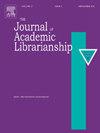生产力的代价:学术图书馆工作人员的职业倦怠和技术压力
IF 2.3
3区 管理学
Q2 INFORMATION SCIENCE & LIBRARY SCIENCE
引用次数: 0
摘要
新技术常常与生产力的提高联系在一起。然而,当技术以人类互动为中心时,它会产生意想不到的后果,影响图书馆工作人员的效率和倦怠感。本研究试图通过考察倦怠、对技术的感受以及它们对学术图书馆工作人员效能感的影响,来理解这些影响。研究人员使用一种测量技术压力的量表,包括排名和开放式回答,从学术图书馆工作人员中收集了54份调查。研究结果表明,学术图书馆是一个以技术为中心的环境,并受到与技术相关的压力因素的影响,如持续的连接、中断和角色过载。尽管学术图书馆工作人员描述了工作效率的提高,但技术的过度使用对图书馆工作人员的健康产生了负面影响。寻求促进幸福的学术领袖必须考虑到新的和现有的技术如何调节图书馆工作人员与顾客和同事保持关系焦点的能力。在采用旨在提高技术效率的技术时,这一考虑是必不可少的。这项研究为学术图书馆在使用和适应新技术时创造以人为本的方法提供了考虑。本文章由计算机程序翻译,如有差异,请以英文原文为准。
The price of productivity: Burnout and technostress among academic library workers
New technology is often associated with increased productivity. However, when technology is centered over that of human-interaction, it can create unintentional consequences that impact library workers' effectiveness and feelings of burnout. This study seeks to understand these effects by examining the intersection of burnout, feelings about technology, and the impact it all has on academic library workers' sense of effectiveness. Using a scale to measure technostress, including ranked and open-ended responses, fifty-four surveys were collected from academic library workers. Findings demonstrate that academic libraries are technocented environments and are influenced by technology related stressors, such as constant connectivity, disruption, and role overload. Even though academic library workers describe improved productivity, technology overuse negatively effects library workers' wellbeing. Academic leaders seeking to foster well-0being must account for how new and existing technologies mediate library workers' ability to sustain relational focus with patrons and colleagues. This consideration is essential when adopting technologies aimed at improving technology effectiveness. This study offers academic library leadership considerations for creating human-centered approaches when using and adapting new technology.
求助全文
通过发布文献求助,成功后即可免费获取论文全文。
去求助
来源期刊

Journal of Academic Librarianship
INFORMATION SCIENCE & LIBRARY SCIENCE-
CiteScore
5.30
自引率
15.40%
发文量
120
审稿时长
29 days
期刊介绍:
The Journal of Academic Librarianship, an international and refereed journal, publishes articles that focus on problems and issues germane to college and university libraries. JAL provides a forum for authors to present research findings and, where applicable, their practical applications and significance; analyze policies, practices, issues, and trends; speculate about the future of academic librarianship; present analytical bibliographic essays and philosophical treatises. JAL also brings to the attention of its readers information about hundreds of new and recently published books in library and information science, management, scholarly communication, and higher education. JAL, in addition, covers management and discipline-based software and information policy developments.
 求助内容:
求助内容: 应助结果提醒方式:
应助结果提醒方式:


